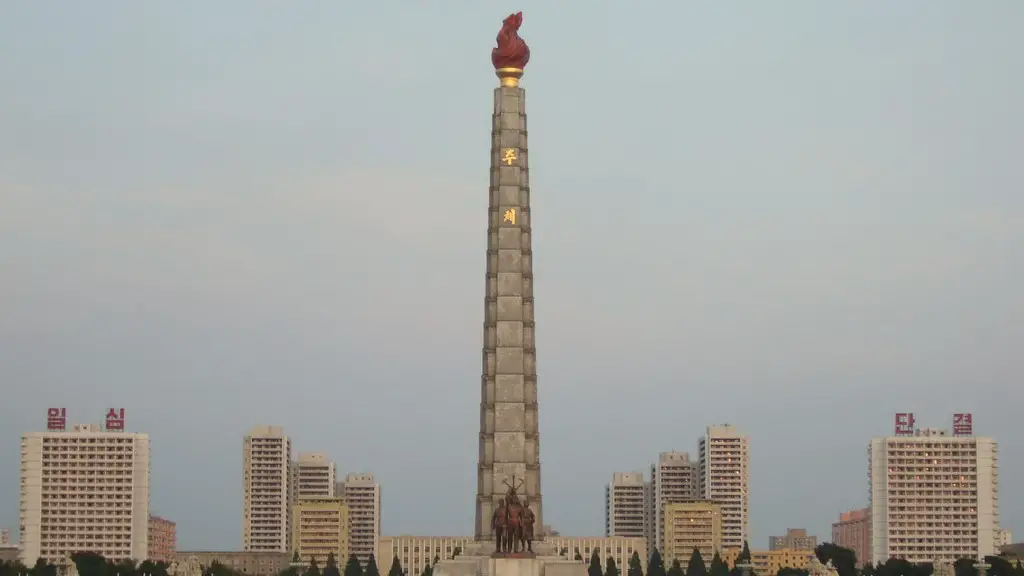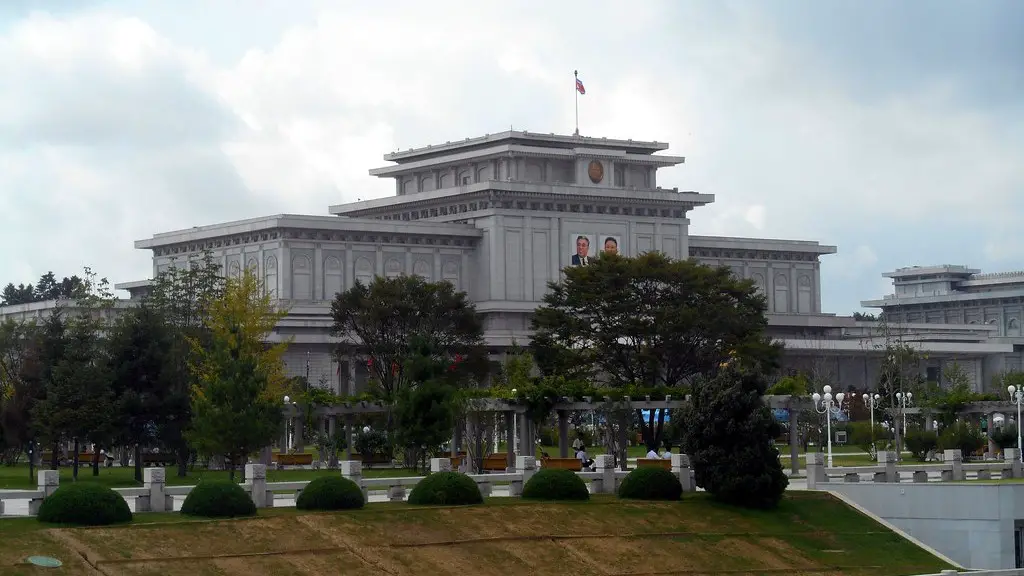Trade and Economic Reforms
North Korea has long been resistant to economic and trade reforms. Some suggest that only under the direct threat of outside economic pressure may North Korean leader Kim Jong Un be moved to real change.
Since its founding over 70 years ago, North Korea has been an extremely isolated and authoritarian state. The government has pursued a strategy of self-reliance and has been highly resistant to global trends and pressures, particularly those related to the free-market economy and international trade. This has resulted in a stagnant, state-controlled economy, with minimal access to modern technology, foreign investment and foreign trade.
However, North Korea’s economic isolation has begun to show signs of weakening. In 2018, the nation held its first successful talks with South Korea in two years, as well as alternating talks with the United States about nuclear disarmament. This has been accompanied by an easing of economic sanctions and an increase in trade between the two Koreas. In late 2019, progress was made to develop a special economic zone in the city of Kaeson.
At the same time, the North Korean government has been quietly introducing economic liberalization policies, aimed at promoting a mixed economic system. These include limited banking and land reforms, as well as the relaxation of some restrictions on foreign currency transactions.
Although the steps taken by North Korea are modest, they demonstrate a willingness to open up to the global economy and, potentially, become a trading nation. It is hoped that further liberalization measures will be introduced in the future and that North Korea will ultimately join the global trading system.
Impact of International Pressure
Given the importance that economic reforms play in improving the economic situation in North Korea, it is clear that international pressure is necessary in order to encourage the government to adopt such reforms.
North Korea’s government has long been resistant to meaningful change and outside pressure, but the situation may be changing. In the 2018 talks with South Korea and the US, North Korea made several concessions, including allowing international inspectors to check on its nuclear facilities and agreeing to end long-range missile tests.
At the same time, world leaders have increased economic sanctions on North Korea and put pressure on the country’s leadership to improve human rights. These efforts have forced North Korea to open up to the international community and seek more productive diplomacy.
Recent events have shown that the government is serious about embracing economic reforms and is willing to engage with the international community. The key question is whether or not North Korea will be willing to loosen its grip on its economy and allow foreign investment, trade and technology into the country.
Political Reforms
Before North Korea can fully join the global trading system, it will first need to implement a number of political reforms. This includes the modernization of its government, which has been largely based on a single-party system and on personality cults since its founding in 1948.
It would be difficult for North Korea to introduce meaningful political reforms without also introducing economic reforms. It is likely that any move towards democracy and civil liberties would need to be accompanied by economic reforms and increased foreign investment in order to be successful.
Will North Korea Change Internally?
It is uncertain whether North Korea will be willing to undergo its own internal transformation or whether it will need to be compelled by international pressure. All the evidence suggests that the government is determined to maintain its current power structure.
The aim of the government appears to be to keep the country under its control, while slowly introducing some economic and political reforms that will not threaten its hold on power. North Korea has already opened up to the global economy more than in the past, but how far it is willing to go is unclear.
Impact of Regional Powers
The role of regional powers in facilitating North Korea’s economic transformation cannot be underestimated. In particular, China has long been a major source of support for the country and is its largest trading partner. China has recently signaled its intention to further open its markets to North Korean products.
South Korea, too, has sought to create closer economic ties with North Korea, including the launch of a North-South economic committee in 2018. More recently, the two countries have undertaken measures to improve infrastructure inter-connectivity and promote trade.
Will North Korea Become Free?
Ultimately, it is impossible to predict exactly what will happen with North Korea, but signs are hopeful that it is slowly but surely moving in the direction of becoming a more open and free society. The challenge for the international community is to ensure that it does not become a puppet or satellite state of either China or the US.
In the meantime, international pressure is necessary to keep up the momentum towards progress. If the world is willing to persist and apply the right degree of economic and political pressure, there is the possibility that North Korea will eventually become a free and open society, in which its citizens can enjoy the freedom and prosperity that come with it.
Human Rights and Reforms
If North Korea is to become a free society, it must also address the issue of human rights, which have long been an area of concern. The country has been criticized for its restriction of freedom of speech, media, assembly and association, as well as its use of torture and other inhumane methods of punishment.
North Korea has taken some steps towards addressing these issues, including the establishment of a National Human Rights Committee in 2014, but far more needs to be done. International pressure is necessary to ensure that the government continues to take steps towards implementing reforms that will protect and improve the rights of its citizens.
International Altruism
Finally, North Korea will need to be welcomed into the international community. This can only be done if other countries are willing to offer assistance, both economic and diplomatic. It is only through acts of altruism that North Korea can be assured of a safe and prosperous future, one in which its citizens can look forward to better lives and greater freedom.
Recent diplomatic efforts have hint that such a scenario may be possible. In 2019, Germany provided North Korea with humanitarian aid, indicating a willingness to help the nation progress. Similarly, China and South Korea have both signaled a commitment to providing economic help and diplomatic support.
It is too soon to tell if these efforts will have lasting effects, but they suggest that North Korea may finally be on the path to becoming a free and open society. Time will tell if North Korea is ready to embrace the principles of democracy, civil liberties and human rights, but it appears that it is slowly taking steps in that direction.


